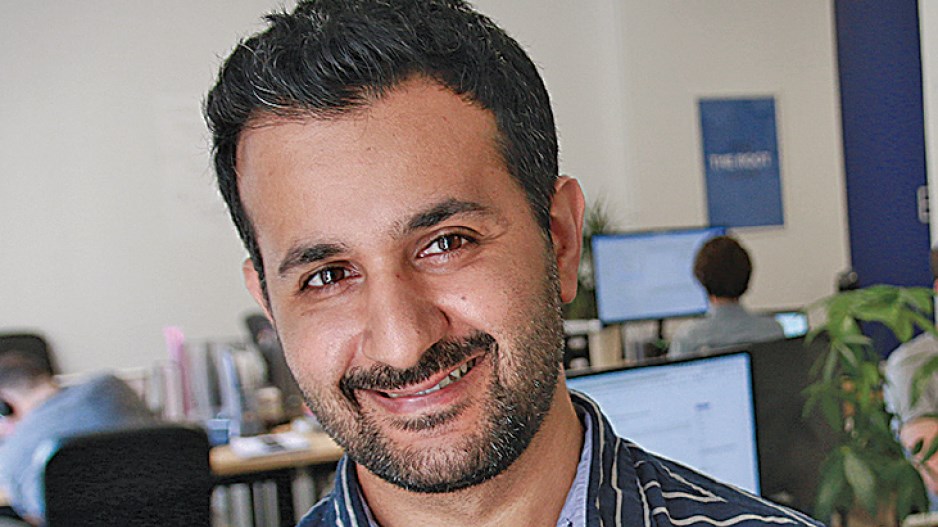Hailed by co-workers for being hard-working, self-directed and reliable, Pouyan Taghipour is recognized as Business in Vancouver’s chief technology officer of the year in the startup category.
The 34-year-old Iranian immigrant taught himself to how to code, and his proficiency with coding has helped his venue-management startup, Event Temple, expand revenue by 350% over the past few years.
The company’s executive team expects that growth to continue so Event Temple can operate at a run rate of $10 million per year by the end of 2023.
CEO Bob Graham describes Taghipour as having a “quiet confidence” and an ability to do the unexpected.
He remembers one time recently when a large hotel client asked him about whether Event Temple’s software was capable of performing a specific task. He told them that it was not, and mentioned the request to Taghipour.
“He worked all weekend and had it out by Monday,” Graham said. “It was a pretty big feature.” The incident is typical of Taghipour’s dedication and value, he said.
Graham had not asked Taghipour to do the weekend work on the software, so he was bowled over when the work was done by Monday, he said.
He also praised Taghipour for being forward thinking enough to build flexibility into the company’s software architecture. The broad framework for the software enables future innovation without having to restructure the application’s foundation.
Software that helps organizations plan events and manage details such as catering requests has been around for decades. But what Event Temple’s software does more effectively than the competition, according to Taghipour, is to link with other applications.
Taghipour has always had a knack for technology.
He completed an undergraduate degree in electrical and computer engineering at Shiraz University by age 23, when he left his native Iran to explore the world. He earned a master’s degree in systems engineering at Australian National University, and he might have stayed in Australia had his family not moved to Vancouver.
He joined them and temporarily worked as a research scientist at Simon Fraser University.
The University of British Columbia’s School of Engineering then accepted him to its PhD program in 2010 and he started that degree, which focused on robotics.
On the side, he co-founded a venture called Prever, which had a product called Coinfresh, a cryptocurrency exchange platform.
Various cryptocurrencies, such as Litecoin and Deuscoin, traded on the platform, and there started to be be some investor interest.
The company was accepted to an accelerator program in the U.S., where a small amount of seed funding was available, with the promise of a larger fundraising round down the road.
Visa complications kept him in Canada, and he and his business partner decided to dissolve the business.
Taghipour also put his PhD on hold and joined legal practice management software venture Clio in late 2013, when the company had about 65 people. When he left in late 2016, Clio had expanded to about 150 people, he said.
A propitious meeting then happened when Taghipour went to a Gastown pub for a technology meet-up event and happened to meet Graham, who at the time had an agency that helped book events for entrepreneurs such as disc jockeys and photographers.
“We built the first version of the software and found a couple hundred customers quickly,” Taghipour remembered, saying that clients were found through channels such as webinars and partnerships.
The simplified early version of the software cost what he called a “cheap” $40 per month, but many clients did not see the value in the software and there was a significant churn rate.
The software advanced in complexity, and Graham and Taghipour started targeting larger businesses. They were able to increase the price considerably.
“We started focusing on venues and noticed that there was a gap in that market,” he said. “Some existing software was very old and outdated.”
The expanding company now employs 10 people, and its customers are increasingly larger hotel chains with operations around the world. •
Q&A:
What was your first computer and how much memory did it have?
The first computer I got my hands on was a Philips 286 that my father had received as a university faculty member. I was around eight or nine years old, and I had figured out how to run games from a floppy disk. The first game I ever played was Prince of Persia. I don't really know how much memory it had. It should have been either two or four megabytes of random access memory.
What is the best movie you've seen that intersects with your work?
The Matrix, as it was one of the seminal movies showing AI enslaving humans. The future of AI is a very hot topic these days, and justifiably so. Although we can argue in terms of intelligence and creativity a single machine is nowhere close to a human, the fact that all machines are connected together through a single network makes it a losing battle for the human brain. I am a big supporter of the Open AI movement for safe artificial intelligence to protect us from any future threats posed by AI.
Which book would you recommend about technology or innovation?
Good to Great: Why Some Companies Make the Leap...And Others Don’t by James Collins
This is the book that we recommend everyone joining our company read on their first week on the job. The authors have analyzed a number of companies over a 40-year period. These companies were mediocre in most of their early life but all morphed into some of the greatest successes of their time. I highly recommend it for anyone who wants to make a great – not just good, as good is the enemy of great – company.
Join us to celebrate standout technology leadership and breakthrough innovation when Business in Vancouver hosts the inaugural BC CTO Awards gala awards luncheon on September 18th, 2019, at the Fairmont Waterfront hotel. For tickets and info, check out biv.com/bc-cto-awards.




